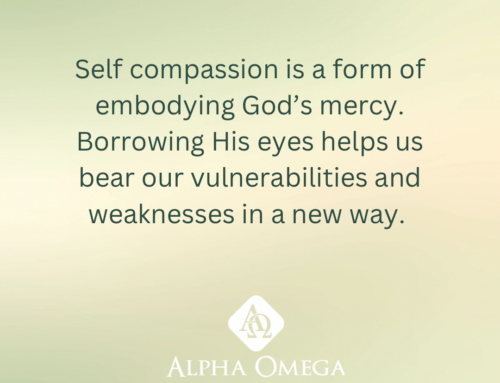As part of Mental Health Awareness Month, we would like to offer some guidelines for engaging the topic of mental health in your home, community, and the Catholic Church. The topic itself still carries with it a stigma that can further alienate those in need of help. We recognize that some of these reasons are because many people just don’t know what to say or how to talk about mental health. We hope that this article will serve as a starting point to inspire much needed conversations about accompanying others in their suffering. Our aim is to facilitate a dialogue within our community that is informed by the highest standard of clinical practice/research and integrated with our beautiful faith.
Practical and Theological Considerations
Mental health conditions are a form of suffering. As such, this topic calls for both a practical and theological response. On the practical side, this will involve looking at helpful communication skills and relational accompaniment. On the theological side, this will involve an examination of the most common Christian responses to suffering and whether these are appropriate for mental health. Due to the complicated scope and nature of both mental health and theology, we cannot claim this article will be exhaustive. Rather, this is a contribution to the ongoing efforts to address mental health within the Catholic Church.
Starting the Conversation
The good news is everyone can talk about mental health. There is no special skill or knowledge required to broach the topic. It may feel awkward or even scary at first, but that is a normal part of growth. The goal is to gradually increase your tolerance for these conversations. The more you practice, the easier it should become. The barometer is different for everyone, and it starts with your own experience. How much (or how little) have you talked about mental health with those close to you? Was this a topic that your family actively discussed or is the whole idea of mental health new to you? Keep in mind that there’s no right answer here. Gauging your comfort level will help you adapt these guidelines to your level of experience.
Once you’ve identified your initial comfort level, it’s time to start expanding your capacity for tough conversations. Start small by letting others know you’re willing to talk about the topic. The best way to do this is by taking advantage of naturally occurring opportunities. It’s very common for us to share our everyday struggles with each other. This can feel like complaining but is often an attempt to connect with each other and receive support.
If you’ve been to therapy, it could be very helpful to share that with someone who is describing similar challenges. Many of our clients are referred by friends and family, so we’ve seen this firsthand! This is crucial because even if we are getting professional help, we need support from those we love. Experiencing mental health challenges are already lonely and isolating enough. It can be relieving to know someone close to us has been through something similar or at least understands what we’re going through.
If you think someone you love might be struggling, you can speak to them privately and start by expressing your care. It’s not helpful to suggest that they “need to” go to therapy (no one likes being told what to do, especially if you’re already feeling down). Instead, you can listen, normalize, and validate what they’re going through. Once you’ve established a conversation about their struggles, you can talk about how therapy might be beneficial alongside your ongoing support. Leaning into this conversation could sound like:
“I care about you, and I’ve noticed some things weighing on you. I’m wondering how you are doing?”
“With everything going on, I’m wondering if you’re feeling overwhelmed?”
“Wow, yeah it makes sense that you’re feeling that way. Thank you for sharing”
“I’ve been through some tough times and found it’s helpful to talk about it. Whatever it is, I’m here to listen and support you as best as I can”
If you can’t have a conversation or there’s no privacy, it’s ok to come back to it later. When the opportunity presents itself, gently share your observations and invite them to talk about it. You could also leave it more open-ended and offer your willingness to talk whenever they’re ready. Again, be upfront and express care for their wellbeing. Sometimes people, in these moments, may need reassurance that they’re not “bothering” you, or that you’re not going to get sick of listening to them. Emphasizing that you’re here for them no matter what can lower the barriers to opening up.
Lastly, as the conversation is ending, please reiterate both your commitment to listen and their courage to share such deep and important aspects of their life. Let them know it’s normal to need to talk about these things, and you’re happy to connect with them in this way.
Continuing the Conversation
While you’re supporting a loved one, it’s best to check-in by asking them if these conversations are helping. Also, you can ask if there’s someone they would be more comfortable with. If so, bring them into the conversation. This approach is helpful for keeping healthy boundaries as well. By acknowledging our limitations, we can continue to advocate for professional mental health treatment in addition to support from friends/family.
After the initial conversation, you can let them know they’ve been on your mind/heart. Follow up by asking how it’s going, how they’re doing since, or offer for them to share more if they’d like. Most of the time, we just want to know that someone cares. This sends the signal that we see them as valuable. We may not have the perfect answers or professional experience, but we have our shared humanity and that is enough to lighten the load.
The Desert of Suffering
Many mental health sufferers describe their experience as incredibly isolating, as if they’re living in an alternate world. It is for this reason that I have chosen the metaphor of a desert. I also find this imagery familiar to us as Christians. Scripture is abundant with stories of God’s people journeying through literal and symbolic deserts. Additionally, the early Christians often fled to the desert to pursue an ascetical life of prayer and fasting, hoping to ascent the spiritual ladder to God. There is something mysterious about this relationship between God and the desert. With this as our frame, we can begin to explore the theological response to mental health. Please bear in mind that I am not a theologian and therefore cannot adequately answer every question raised. Instead, I hope to identify the most helpful (and not helpful) theological responses from a clinical point of view.
Most people with mental health conditions experience a wide range of symptoms in varying degrees of intensity. While there are certain commonalities, definitive descriptions of mental health conditions often elude sufferers. One person’s experience of the desert may differ dramatically from another person’s, even when they are dealing with the same condition. This variability makes it difficult to suggest a “one size fits all” theological answer.
In many cases, offering a theological response to these conditions is about providing a reason for suffering. We hope to comfort sufferers by explaining how their pain makes sense from the perspective of our faith. A potential problem with this approach is that the suffering associated with mental health conditions often doesn’t make sense and can feel completely arbitrary. This reality presents us with the very real possibility of imposing meaning onto another person’s experience and in doing so, increasing their suffering. It can be harmful to insist that someone else’s suffering has meaning when they have not arrived at this conclusion themselves. In this way, the incoherence and inexplicability of mental health conditions often defy our common responses to suffering.
The unique and complex nature of mental health necessitates a theological response that accounts for both the diversity of symptoms and the persistent presence of meaninglessness. In our pursuit of a response that sufficiently meets these criteria we can start with some recent research on the subject. One study suggests that Catholics are less likely than other Christian denominations to assign spiritual causes and treatments for psychological conditions. When they do, it is likely to come in the form of identifying psychological suffering as divine instruction or redemptive suffering.
Divine instruction is certainly an option for making meaning of psychological distress, but it is not evident that this can be applied universally. While some sufferers benefit spiritually from their condition, there are just as many who do not. In fact, many sufferers, despite their best efforts, are pressed to find any good whatsoever that comes of their condition. We are also confronted with the very real tension between God’s permissive Will and our affirmation of divine love. Some sufferers may baulk at the idea that God is allowing suffering for their benefit. Suggesting as much could further alienate them from the divine presence that they need amid their pain.
You may be thinking, “Well, then, what are we to do as Christians who have loved ones with mental health conditions?”. Instead of throwing our hands up and being resigned to helplessness/hopelessness, there is an alternative. It sounds like: “I don’t know why this is happening to you but you’re not alone, I’ll be here to go through it with you”. We must avoid being prescriptive about how someone “should” make meaning of their suffering and instead offer resources for those standing before God with their pain. The only person in the position to make meaning is the sufferer themselves, under the guidance of those they have entrusted as their spiritual advisors. Our job is simply to stand beside them and allow meaning to come alive as an experience of connection.
Journeying with Others Through the Desert
The best theological answer I have found is accompaniment, an incarnational form of theology. We are to follow in the footsteps of God Himself who became human to free us. He is a God that answers suffering with His Presence. He is a God that sees our pain and responds with love. This is not just any love, but a love that strives to expand our humanity. We are called to imitate Him by offering our presence to the most vulnerable among us, honoring and expanding their humanity on God’s behalf. We give others strength and meaning by suffering with them.
In her book Dust in the Blood: A Theology of Life with Depression Jessica Coblentz emphasizes the importance of accompaniment saying, “Sufferers frequently lift up friends, family members, and caretakers who accompany them, not imposing purpose or demanding a cure but simply staying with them amid the disconnection and debilitation of depression”. While she is specifically referencing depression, I believe this applies to all mental health conditions. She goes on to say that aiding others in their survival is often received as an experience of divine presence. Offering ourselves in response to unexplained or unresolved suffering is an act of Christian love that anchors those struggling to come to terms with their experience:
“Offering presence while exercising proper theological restraint can be difficult, especially for Christians who have been socialized to justify and explain human suffering. Thus, part of the work of Christian discipleship in a world of tragic suffering should entail the cultivation of a disposition that enables this kind of unimposing accompaniment – whether in the form of sheer presence or in accompanying a sufferer as she discerns an interpretation of her own condition”(Coblentz, p. 203)
As Christians, we face a courageous call to become like Christ. In our world today, discipleship often looks like being bold enough to walk with each other through our most difficult moments. This can be especially true when those moments defy explanation, logic, or understanding. We are called to hold our ground when confronted with tragedy, mediating divine presence to those who need it most. Our presence can be a much-needed expansion of hope and vision for someone trapped in the darkness of the desert. This form of incarnational theology offers us a way of responding to the complexity of mental health conditions without overstepping our boundaries.
* The information provided is for self-enrichment and not intended to replace any necessary mental health treatment.
Warmly,
Jonathan Dixon, LMFT
Jonathan Dixon is a Licensed Marriage and Family Therapist in Virginia who has offered mental health services at Alpha Omega Clinic’s Fairfax office since 2013. He is an active member of the Association of Marriage & Family Therapy.





